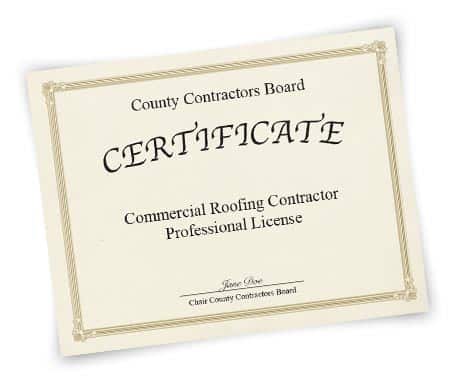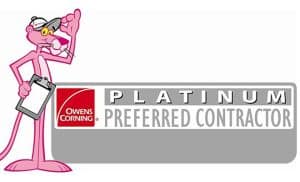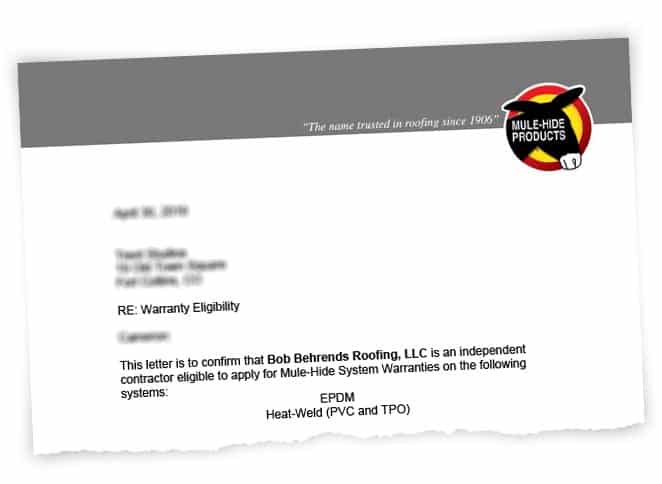Choosing a good commercial roofing contractor, if you don’t already have one, can be difficult. What do you ask them, or look for, to find out if they are trustworthy, reliable, and do quality work? When on-line reviews can be faked, and when the company can say anything they want on their own website, how can you research the company yourself?
Below are 14 things that will help you choose a good, reliable commercial roofing contractor.
Continue reading for more detailed information.
Quick Answer: A good commercial roofing contractor will be licensed and insured, will have experience, will be a member of a recognized roofing association, will be certified by a well-known roofing material manufacturer, will warranty their work, roofing material manufacturers will also warranty their work, and will have lots of positive online reviews, among other things.
1. Is The Commercial or Flat Roofing Contractor Licensed?

If a commercial roofing contractor is licensed, it means they have been granted a trade license as required by local laws. In Colorado, roofers are not licensed at the state level. To become licensed, the roofing company must pass business practice and trade skill tests, pay a fee, and prove they are insured and/or bonded.
To verify the commercial roofing contractor is licensed, your city or county might have a Professional License Search webpage available for you to search. For example, see Fort Collins’ Professional License Search page.
Or call your county’s or city’s Contractor Licensing division.
2. Do They Have Experience?
If the commercial roofing contractor doesn’t have experience, you don’t want them to ‘cut their teeth’ on your roof. When a roofer is just starting-out, if they use your roof as their training grounds, you can bet mistakes will be made, and you will pay the price. Save yourself the headache and keep looking for someone with more experience.
How do you know if they have experience?
a. One way is to start with their website to get the names of businesses they’re installed commercial roofs on. Next, contact those businesses to (1) confirm they did in fact install a commercial roof for that business, and (2) ask the business owners how the roofing project went.
b. Another way is to find out if they’ve worked with any general contractors and, if they have, contact those general contractors to see if they have in fact installed roofs for them, and how it went.
3. Are They a Member of a Roofing Association?

It’s not easy to be a member of a reputable roofing organization or association. If a commercial roofing contractor is a member, that means they’ve met certain criteria. For example, when applying to the Colorado Roofing Association, they must have the following:
- shown they’ve been in business a minimum of two years
- worker’s compensation coverage
- general liability protection
- a certain code of ethics
- passed roofing examinations
- satisfactory business references
Visit the organization’s or association’s website and search for the commercial roofing contractor. If they’re there, great! That checks out!
Here’s our profile on the Colorado Roofing Association’s website.
4. Is The Contractor Certified or Qualified?

Just like becoming a member of a roofing association, it takes a lot to become certified or qualified or ‘preferred’. Take Owens Corning, for example. In addition to the above items, to become a Preferred Contractor with them, the company must also have no legal actions or judgements during the past 5 years, and no personal or business bankruptcies during the past 7 years. To find out if a commercial roofing contractor is a Preferred Contractor of Owens Corning, use their “Find a Roofing Contractor” page.
For example, here’s our profile on the Owens Corning website.
5. Are They Reputable?
Find out which commercial roofing product manufacturers they work with, for example Mule-Hide, Versico, or GenFlex, and contact them. Ask them if the commercial roofing company you’re considering hiring is in good standing with them. This will let you know if the commercial roofing contractor has a good reputation with the manufacturer.
6. Do They Have Insurance?
General liability insurance helps to protect your property should anything happen to it. If a roofing contractor doesn’t have general liability insurance, and you let them work on your roof, and they do something that causes damage to your property, it can come down to your word against theirs with respect to who caused the damage, how it happened, etc. It is in your best interest if the roofing contractor you hire has general liability insurance.
You can obtain a copy of the roofing contractor’s NCCI (National Council on Compensation Insurance) report from their insurance carrier, showing worker’s compensation coverage, who is covered and their EMR (Experience Modification Rate) rating. Just ask the contractor who their insurance carrier is and contact them.
7. Do They Warranty or Guarantee Their Work?
Find out if they warranty their labor. Don’t just take their word for it. Is it noted on their contract or any other marketing material, and/or on their website. If they don’t warranty or guarantee their work, you might want to look for a different roofing contractor.

8. Can They Warranty the Product?
While you’re on the phone with the roofing product manufacturer, or emailing with them, also ask them if the roofing company is eligible to apply for a warranty for the product the roofing company is going to install for you. For example, if the roofing company is going to install PVC onto your roof, ask the manufacturer if the roofing company is eligible to apply for a warranty for that PVC system. If the roofing company is, this means the roofing contractor has had some training in installing that commercial roofing system, possibly even with some help from the material manufacturer, and the manufacturer has reviewed their workmanship and has found it satisfactory.
As an example, a recent client of ours forwarded this email to us from Mule-Hide:

9. References
a. from past clients
Just like hiring an employee, it’s good to hear from past people they’ve worked for to see how good a job they did. Ask the roofing contractor you’re considering hiring for a few names of their most recent commercial roofing projects that are similar to yours. It’s a sign things didn’t go well if they are can’t, won’t, or are reluctant to share just a few names. If the roofing company has any experience at all, they should be able to give you a name or two. If they can’t because they don’t have any, that means they don’t have any experience with the commercial roofing material you need, and you shouldn’t hire them. Find someone with more experience working with the commercial roofing system you need.
Of course, if they do give you some names, contact those past clients to see how the job went. Ask if they’re happy with how the project went and if they’re happy with the product they received.
b. from roofing product manufacturers
You might also be able to get references from roofing product manufacturers. Some manufacturers prefer to work with certain contractors because they know the contractors does a good job installing their products and, as a result, have fewer warranty claims.
10. Municipality’s Codes
Make sure the roofing company you’re about to hire is familiar with, and abides by, your city’s, county’s, or town’s building codes. If they are not, or choose to ignore, it could cost you to rectify the code violation later. Depending upon the violation, it could cost a lot, so it’s always best to abide by the building codes and do it right the first time.
11. Roofing Permit
Some counties and cities do not require a permit for a new roof or a reroof. You should find out if your county and city require a permit for a new roof or a reroof. You should also find out if the roofing company you’re considering hiring pulls permits. If it’s stated on their contract and/or agreement that they pull permits, that’s great. Find out what the permit number is once they’ve got it and verify it has in face been pulled with the county or city. You might be able to verify the permit on your city’s or county’s website.
Why?
If you hire a roofing company that doesn’t get a permit when they should, you will be in violation of building code and may be responsible to pay additional fees, which might be double what the normal permit fees are.
12. Bank References
Getting bank references is also a good idea. All this means is contacting their bank and ask if the roofing company in question is in good standing. You won’t be able to get details about their account, such as how much they have, but the bank will be able to tell you if the roofing company is financially stable.
13. Who’s Supervising and What Experience Do They Have?
It’s good to know who’s in charge of a project. If you have questions or concerns, you’ll know who to see. Also, make sure that supervisor is going to be on the job site if you do any questions or concerns.
Furthermore, find out what experience they have. If you’re having a rubber roof installed, but the supervisor only has experience with asphalt shingles, they’re not qualified to be supervising your project.
14. On-line Reviews
I’ll mention on-line reviews anyway, and last. If a company has enough reviews across multiple review websites, they’re worth considering. You don’t want to just pay attention to one review website, such as Yelp, especially if there’s only a few reviews. Furthermore, keep in mind that Yelp is known for hiding positive reviews, so be sure to checkout reviews Yelp doesn’t recommend. Google is better, but they, too, occasionally don’t let reviews get posted.
It’s also very easy to post a fake review. After all, how is the review website suppose to know you really didn’t use X Roofing Company?
So, it’s better to consider reviews from multiple review sites, such as Google, the Better Business Bureau, Yelp, FaceBook. It’s also good to read reviews from roofing material manufacturers, such Owens Corning and GAF. Reviews left on customer satisfaction websites, such as GuildQuality, are also worth considering.
The Bottom Line
The above list are mostly things you can verify or check on your own without having to take the roofing contractor’s word. It would be great if we lived in a world where everyone was honest. That’s not the world we live in, however. Unfortunately, there are roofing scammers out there. If you haven’t worked with a commercial roofing contractor before and are just getting started looking for your first one, take a few minutes to do some of things on this list and protect yourself.
Leave a comment below if you have any questions or suggestions.
